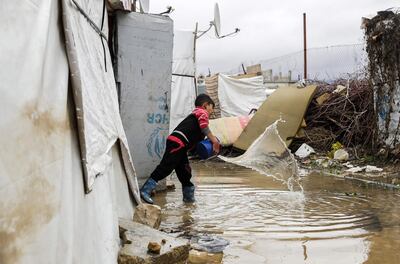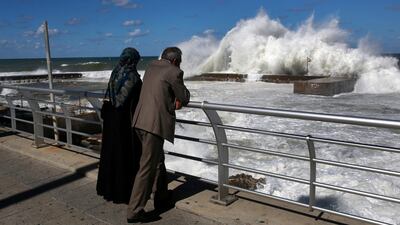Dramatic footage has emerged of the damage caused by Lebanon’s first winter storms which hit the country on Thursday. In the capital, heavy rain flooded one of Beirut’s fanciest shopping malls, ABC Verdun, hailstones the size of tennis balls caused the glass facade of a telecom store to collapse, and strong winds ripped billboards and scaffolding off buildings, injuring several people.
Syrian refugees living tents in informal settlements outside the capital bore the brunt of the storms as wind tore their homes apart and water rose to dangerous levels. Lebanon hosts the greatest number of refugees per capita in the world, with close to a million Syrians officially registered with UNHCR, although local authorities estimate their number to be higher.
The Bekaa region, a fertile valley which houses the majority of the Syrian refugee population, was hit particularly hard. In Bar Elias a tree smashed through several tents, leaving them with gaping holes.
"A few families had to move to other tents as theirs were too damaged to sleep in," Malek, a Syrian resident of the informal camp built near a river in Bar Elias, told The National. "They're afraid that if the river floods, they will not be able to stay there at all."
Hiba Fares, UNHCR external relations officer for the Bekaa region, said aid workers provided new tents and had attempted to mitigate flood damage in advance by laying out gravel on the ground. No casualties were reported.
Activists from Arsal, a region in North Bekaa heavily populated with refugees, shared pictures on WhatsApp of collapsed corrugated metal roofs and flooded streets. "Tents were easily damaged by rain as their fabric was worn and the wood used to hold them up was old," Oum Hussein, a Syrian refugee living in Arsal, told The National.

Many fear that this is only the beginning of another difficult winter for refugees in the Bekaa, where snow storms and freezing temperatures are common. Fifteen Syrians froze to death last winter as they attempted to cross into Lebanon through the rugged mountains that separate the two countries.
“The situation is very bad. People need blankets and mazout [heating oil] for the winter," said activist Muhamad Badran.
As the Syrian war drags on into its eighth year, refugees in Lebanon routinely complain of worsening living conditions. Help from international organisations has dwindled and access to the labour market remains restricted. Lebanese authorities have facilitated the return of several thousands of Syrian refugees this year, but others are reluctant to return, fearing arbitrary detentions or military conscription.
Despair gave place to irony in a video tweeted by senior opposition figure Hadi Albahra, a member of the Syrian negotiations commission.
“Thank God, we are flooded. We want to thank the Lebanese and Syrian authorities for their benevolence and God most of all," says a man as he films an unnamed flooded refugee camp in Lebanon. Two women sit inside a tent filled with muddy water with a child on their knees.
“All we ask now from the Syrian and Lebanese governments is to send us boats."


